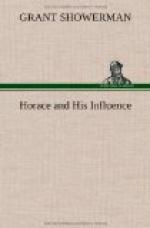The name of Venantius Fortunatus brings us to the very brink of the centuries called the Middle Age. If there are those who object to the name of Dark Age as doing injustice to the life of the times, they must at any rate agree that for Horace it was really dark. That his light was not totally lost in the shadows which enveloped the art of letters was due to one aspect of his immortality which we must notice before leaving the era of ancient Rome.
Thus far, in accounting for Horace’s continued fame, we have considered only his appeal to the individual intellect and taste, the admiration which represented an interest spontaneous and sincere. There was another phase of his fame which expressed an interest less inspired, though its first cause was none the less in the enthusiasm of the elect. It was the phase foreseen by Horace himself, and its first manifestations had probably appeared in his own life-time. It was the immortality of the text-book and the commentary.
Quintilian’s estimate of Horace in the Institutes is an indication that the poet was already a subject of school instruction in the latter half of the first century. Juvenal, in the first quarter of the next, gives us a chiaroscuro glimpse into a Roman school-interior where little boys are sitting at their desks in early morning, each with odorous lamp shining upon school editions of Horace and Virgil smudged and discolored by soot from the wicks,
totidem
olfecisse lucernas,
Q_uot stabant pueri, cum totus decolor
esset_
F_laccus et haereret nigro fuligo Maroni_.
(VII. 225 ff.)
The use of the poet in the schools meant that lovers of learning as well as lovers of literary art were occupying themselves with Horace. The first critical edition of his works, by Marcus Valerius Probus, appeared as early as the time of Nero. A native of Berytus, the modern Beirut, disappointed in the military career, he turned to the collection, study, and critical editing of Latin authors, among whom, besides Horace, were Virgil, Lucretius, Persius, and Terence. His method, comprising careful comparison of manuscripts, emendations, and punctuation, with annotations explanatory and aesthetic, all prefaced by the author’s biography, won him the reputation of the most erudite of Roman men of letters. It is in no small measure due to him that the tradition of Horace’s text is so comparatively good.
There were many other critics and interpreters of Horace. Of many of them, the names as well as the works have been lost. Modestus and Claranus, perhaps not long after Probus, are two names that survive. Suetonius, as we have seen, wrote the poet’s Life, though it contains almost nothing not found in the works of Horace themselves. In the time of Hadrian appeared also the edition of Quintus Terentius Scaurus, in ten books, of which the Odes and Epodes made five, and the Satires




